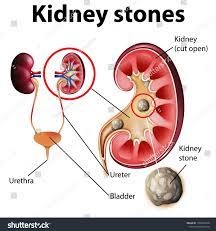
Developing kidney stones: Doctors advise against dehydration
Kidneys play a vital part in the human body by removing waste. However, some conditions may affect the kidney’s ability to function properly and key among them is kidney stone.
A urologist, Dr Evans Akpakli, educating viewers on kidney stones on the 12th episode of the 10th season of the Vodafone Healthline series, urged people to drink lots of water and reduce their salt intake to lessen their chances of developing kidney stones.
Advertisement
This, according to him, was because cases of kidney stones had increased significantly among the general population over the years.
Kidney stones
Dr Akpakli explained that kidney stones are primarily formed because of an overconcentration of salts in the urine, which, over time, became solid when the body was dehydrated.
He also explained that kidney stones, which were formed in the kidneys, ureter or the bladder, could occur due to excess intake of animal protein, excess intake of cocoa, excretion of lots of calcium oxalate and uric acids, recurring urinal tract infection, and genetic predispositions, among others.
Dr Akpakli added that people who suffered from the condition, typically experienced unrelenting severe pain, particularly in the flanks, where the kidneys were.
Also, he said some could experience difficulty urinating because of the blockage while others spotted blood in their urine.
Dr Akpakli stated that developing kidney stones could ultimately lead to kidney failure, but, however, stated that the condition could be treated with a variety of procedures, ranging from surgery with specialised tools to medications that ease the ureter to enable a patient to pass out the stones in their urine.
“There are treatment options available, so there is no need to travel outside,” he said.
Dr Akpakli, therefore, urged the public to eat balanced diets and stressed the need for people to stay hydrated at all times.
Journey so far
Throughout the season, Vodafone has come to the aid of many people with various illnesses who, mainly because of financial constraints, could not seek proper medical care.
The episode highlighted the stories of some of those beneficiaries and how much progress they had made since Vodafone started its interventions.
They were little Charles, who had developed an extended stomach as a result of an inability to pass stool since birth; young Jeffery, who had a kidney problem; Grace, who had complications with her womb, and Elisha, who mistakenly ingested caustic soda.
Families of each beneficiary expressed extreme gratitude and appreciation to Vodafone for helping save their loved ones.
Myth Busters
In the myth busters segment, the host and her two-doctor panel discussed whether a woman could get pregnant during her period.
Both doctors Aba Folson and Kwekuma Yalley explained that even though the phenomenon was not entirely common, women should not discount the possibility of it happening, saying, “never say never in medicine”.
They, therefore, advised women to enlighten themselves by reading more about their cycles to enable them to understand their bodies better.



